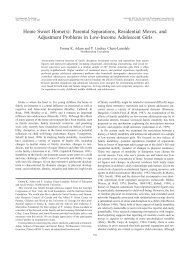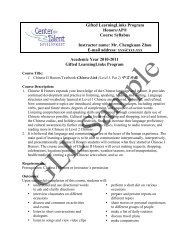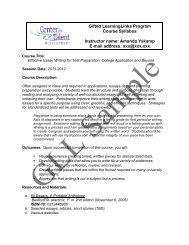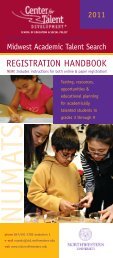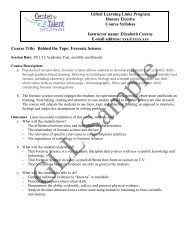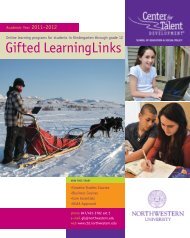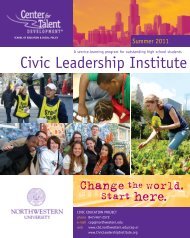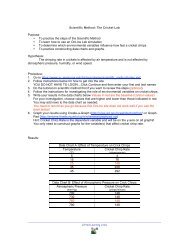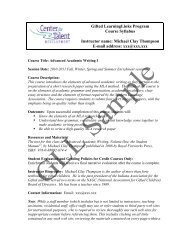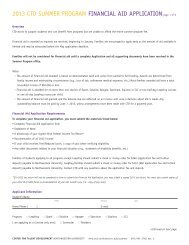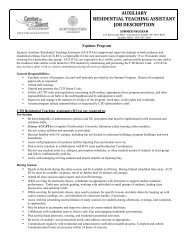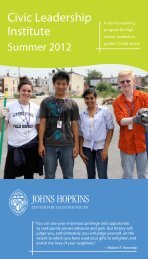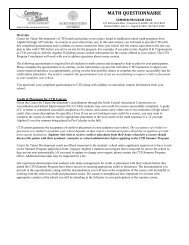LEAPFROG HALF-DAY COURSES (<strong>for</strong> students PreK–grade 3)1-A (1/2) Gods & GoddessesHow did Zeus escape being swallowed byhis father? Why is Aphrodite the goddessof love and beauty? In this course, studentsgo back in time to find answers toquestions such as these. As students discusstheir readings they strengthen theirvocabulary, comprehension and analyticalskills. Students create their own storiesexploring events and natural phenomenathrough the actions of gods and goddesses,synthesizing their newfoundknowledge.1-A (2/3) Castles & DragonsThe colorful history of Medieval Englandcomes alive through the legends and storiesof knights and quests. After gaining abase knowledge of medieval historythrough research and engaging activities,students collaborate to create their ownprojects representing the ideas and storiesthat have captured their imaginations.Week 2 (July 16 - 20)UNSOLVED MYSTERIESUnanswered questions and lingering mysteriesstump students as they considersolutions to cold cases in history. Criticalthinkingskills are enhanced as studentsanalyze literature and try to determinewhat happened and why. Writing activitiesand projects encourage students to synthesizethe in<strong>for</strong>mation they uncover.2-A (PreK/K) The Secrets of the SphinxThe Great Sphinx of Giza is an ancientmonument built near Egyptian pyramids.A sphinx is a mysterious creature that isusually drawn by artists as part human andpart animal. Many questions remain unansweredabout how and why the ancientEgyptians constructed monuments andcreated art in the image of the sphinx. Inpairs and small groups, students polishtheir critical thinking skills as they examinemaps and photographs, build models, andread stories about this ancient creature.2-A (K/1) The Mysterious Disappearanceof Amelia EarhartMany have studied the disappearance ofthe famous airline pilot Amelia Earhart,but few clues have been found. Creativeprojects such as writing editorial newsstories and drawing detailed time linesallow students to enhance their understandingof her disappearance and <strong>for</strong>mand document their own theories andopinions.2-A (1/2) The Bermuda TriangleChristopher Columbus was the first tomake note of curious conditions in theBermuda Triangle, a region of the AtlanticOcean. Since that time, hundreds of shipsand planes have disappeared in the area.Students read stories and personalaccounts about these strange happeningsin the Bermuda Triangle and <strong>for</strong>mulatetheir own theories about the causes as theyexpand their writing and critical thinkingskills.2-A (2/3) The Many Mysteries of SpaceSpace is endless and so are the questionsabout its origins, composition, and uniquefeatures. Students explore several of themysteries of space including black holes,quasars, wormholes and dark matter byreviewing the research, reading aboutrecent discoveries, and considering thevisual evidence. Students delve into aspace topic of interest and present thestory behind the phenomenon.Week 3 (July 23 - 27)YOU’RE IN THE STORY!Stories are a powerful way to communicateideas, emotions and in<strong>for</strong>mation.Settings from a restaurant to the AmazonBasin provide the backdrop <strong>for</strong> students tocreate and act out their own stories.Students strengthen language and literacyskills through dramatic play, creative writingand storytelling, reading and research,and collaborative problem solving.3-A (PreK/K) Open Your Own RestaurantEveryone loves a good meal and what’smore fun than eating out? Students createa restaurant as the setting <strong>for</strong> their ownstories and imaginative play. Groups ofstudents work together to design theirrestaurant by developing scripts, murals,posters and menus. The restaurant comesalive as students hone their language andearly writing skills through creative storytellingand dramatization.3-A (K/1) On SafariAs photographers on a safari trip to Kenya,students learn about African topographyand the animals that are found in Kenyangame reserves. Students imagine and createtheir own game reserve, research thelocal Maasai culture and create a safariguidebook. Along the way, studentsencounter a variety of challenges that theymust discuss, research and solve together.3-A (1/2) Life in Ancient EgyptBy creating a story about a communitythat lives in the Nile River Valley, studentsinvestigate the culture and history of theancient Egyptians. While role-playingmembers of Egyptian families, studentslearn about daily life, agriculture and tradeand hardships such as drought. The creationof stories, murals, skits and posterschallenge students to communicate theirideas using a variety of skills.3-A (2/3) The Amazon Rain<strong>for</strong>estThe global impact of de<strong>for</strong>estation isexamined as students analyze a lumbercompany’s plan to buy a reserve. Throughtheir roles as biologists, game wardens andindigenous people students explore theAmazon Basin’s ecosystem as a habitat andsource of materials. Models, skits, articlesand stories are used as students use criticalthinking skills and persuasive writing todetermine the fate of the reserve.MATHEMATICS COURSESStudents with an identified strength inmath, based on test scores or other academicmeasures, may enroll in a Mathematicscourse. Students must have a mathematicsscore in the 95 th percentile or higher on anin-grade, nationally normed standardizedachievement test or submit an AdmissionPortfolio (portfolio option available only tostudents completing grades 2 or 3). See page16 <strong>for</strong> more in<strong>for</strong>mation about eligibility.Identify the appropriate section <strong>for</strong> yourchild based on his/her current grade level.The course code and grade level precede eachcourse title.10 CENTER FOR TALENT DEVELOPMENT NORTHWESTERN UNIVERSITY www.ctd.northwestern.edu 847/491-3782
NEW! MATH STUDIOStudents at our Skokie and Chicago sitesare invited to enroll in an afternoonMath Studio course. Led by artist-educators,students extend their math learningthrough arts exploration. Eachstudio classroom will offer group activitiesas well as centers <strong>for</strong> drawing, reading,puzzles, and dramatic play. Mathstudio instructors collaborate with theLeapfrog math instructors to connectthe afternoon arts activities with themath curriculum, allowing students toapply what they’ve learned in new andcreative ways. Math Studio is designedto strengthen creative thinking andexpression using academic subjectmatter. See descriptions on pages 4-5.Week 1 (July 9 – 13)CODES AND SYMBOLSThe world is full of codes and symbols andmath skills help you decipher them! Fromnumber patterns to complex ciphers,young code breakers develop strategiesand discover the secrets behind a fascinatingvariety of codes.1-B (PreK/K) Number SecretsHow many different ways can you depictthe number three? A digit is just one symbolthat represents a numerical concept.Amazing secrets are revealed as studentspractice identifying and using symbol systemsto represent mathematical ideas.1-B (K/1) Code BreakersBreaking a code often involves identifyinga pattern. Morse code, <strong>for</strong> example, is apattern of dots and dashes. Students identifypatterns of numbers, letters, sounds,and symbols and use what they havelearned to create their own secret codes.1-B (1/2) Math <strong>for</strong> SpiesThere’s more to being a spy than justwearing a disguise. Spies also have to beexpert mathematicians. In this course,aspiring spies use math to create secretcodes, plot the coordinates of enemyhideouts, and discover, through logicalreasoning, the identities of other spies.1-B (2/3) Secret PasswordsHow do computer passwords work? Whyare some passwords better than others?This course explores a variety of methods<strong>for</strong> using and creating passwords and passcodes,and develops the mathematical andcritical-thinking skills necessary to createmaster passwords.NEW! 1-S (K-3) Codes & SymbolsMath StudioSee description on page 4.Offered: P.M. in Skokie & Chicago <strong>for</strong>students in K through grade 3Week 2 (July 16-20)PUZZLES & GAMESFind the right strategy and a solution willemerge! With a focus on logical thinking,young mathematicians use reasoning, estimationand mental math skills as they playgames, work through puzzles and tackleword problems.NEW! 2-B (PreK/K) Puzzles & ProblemsPuzzles, tangrams and story problemschallenge students to seek solutions usingcomputation, logic and deduction.NEW! 2-B (K/1) Games & StrategiesComplex games and tough-to-solve problemsare no match <strong>for</strong> students armed withthe estimation and reasoning skills theyacquire in this course.NEW! 2-B (1/2) Mind Bogglers:Predictions & ProbabilityStudents’ analytical skills are challenged asthey make educated predictions and considerprobability — all in the context of wordproblems, chance games and brainteasers.2-B (2/3) Brain Twisters: Multiplication &FractionsSometimes solving a math problem is likeuntangling a knot. Challenges keep youngminds churning as they use fractions andmultiplication to arrive at solutions.NEW! 2-S (K-3) Puzzles & GamesMath StudioSee description on page 5.Offered: P.M. in Skokie & Chicago <strong>for</strong>students in K through grade 3Week 3 (July 23 -27)DOLLARS & CENTS: BUSINESS BASICSWhy do you need money? How do youmake money? What does it take to create asuccessful business? From working withbudgeting, currencies, and systems <strong>for</strong>tracking success to analyzing profit/lossand supply/demand relationships, participantslearn about finance and businesswhile applying their mathematical skills.3-B (PreK/K) Coins & Currency:Money In Our WorldMoney doesn’t grow on trees! Students inthis course learn where money actuallycomes from and its role in the world.Course participants strengthen their computationskills as they explore and comparedifferent currencies, learn the basics ofexchange and value, and practice countingand making change through games andsimulations.3-B (K/1) Bank On It: Savings & Checking“A penny saved is a penny earned.” —Benjamin Franklin. Budding bankersexplore the concept of a bank and its alternatives.After delving into topics includingsavings, interest and checking, studentspractice real-world skills as they establishtheir own bank and set up different typesof bank accounts, make deposits and withdrawmoney.3-B (1/2) Budgeting a BusinessAre you making money? To answer thatquestion, students create a kid businessand set up a budget <strong>for</strong> their new enterprise.From considering supply anddemand to calculating costs and payingemployees (and, hopefully, turning aprofit), students advance their creativethinking,problem-solving and computationskills as they learn about building abusiness budget.= Creative Studies Course847/491-3782 www.ctd.northwestern.edu NORTHWESTERN UNIVERSITY CENTER FOR TALENT DEVELOPMENT 11



